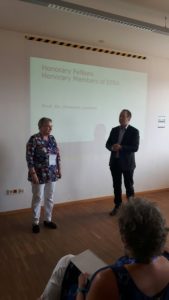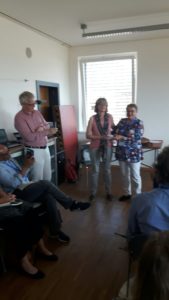Wrapping up the ECER 2019 experience – Part Four: Developments in the VETNET network
With my recent blogs I have been wrapping up my experiences on the European Conference on Educational Research (ECER 2019) that took place earlier this week in Hamburg, Germany. The first post focused on the Opening session of the VETNET network (including background information on VETNET and other networks). The second post focused on the sessions that discussed the ongoing TACCLE projects (in which I and my colleagues are working). The third post focused on presentations that have an immdeiate relevance for the TACCLE project. In this fourth post I try to give insights into recent developments in the VETNET network.
Organisational consolidation of the VETNET network
As I have already mentioned in my first post, the ECER conferences are organised by the European Educational Research Association (EERA). EERA was founded in 1994 as the European umbrella organisation of national associations for educational research. Whilst the representatives of the national associations are in charge of the management, the development of the conference programs is the matter of networks. EERA has currently 32 thematic networks (and the Emerging Researchers Group) that each prepare and run a network program in the annual ECER conference.
The VETNET network is one of the oldest and largest networks and it has from the very beginning had an identity of its own kind. It has brought together researchers who focus on vocational education and training (VET) and who may have somewhat different academic backgrounds. However, there has been a strong commitment to develop a European research community that is open for interested colleagues outside Europe. In this respect VETNET started to shape organisational structures and develop common procedures at an early stage. By the year 2000 it got an elected network board that was working on the basis of jointly approved regulations. Parallel to this the network consolidated the pattern of double-blind peer reviews of conference proposals. By 2004 it got its first pilot website to present the conference program and the contributions.
During the years of growth the issue of membership had been kept open. The liberal interpretation was that all who participated in the VETNET program were also invited to participate in the VETNET assembly as members. By the time that the VETNET activities beyond the ECER conference started to get more standing (see below) this was too ambiguous. Therefore a task force led by Johanna Lasonen – together with the link convenors Barbara Stalder and Christof Nägele – prepared new regulations. These were then matched with the guidelines that EERA prepared and presented at the VETNET assembly. Based on the new regulations, a new VETNET board will be elected in ECER 2020.
International Journal for Research in Vocational Education and Training (IJRVET) and the Vetnetsite
From the year 2000 on VETNET has had the intention to set up a journal for European and international VET research. At that time a working group was negotiating with a commercial publisher. After a period of latency (due to organisational rearrangements on the publishers’ side) the first initiative led to creation of a journal without VETNET involvement. Few years later the idea was brought back to discussion – now with the intention to set up Open Access journal using an appropriate platform. By ECER 2013 the concept was prepared to maturity and by ECER 2014 the first issue was published. Here it is worthwhile to note that the journal was launched as an international journal (and it reached a wider international support). During the years after, the journal has been published on regular basis, its status has been acknowledged and it is being used as the organ of VETNET. A special step forward was taken when the articles of the years 2017 and 2018 were made available as the respective IJRVET Yearbooks.
Parallel to this, the earlier pilot websites for publicising the VETNET conference program and sharing the presentations have been replaced by the current Vetnetsite.
Conferences, interim conferences and proceedings
Alongside the founding of ht IJRVET the VETNET network has made progress with interim conferences and with publishing the conference proceedings. At an earlier stage, during the preparation for ECER 1999 the VETNET program chair Johanna Lasonen managed to get the conference papers in time and published a hard copy proceedings publication by the conference. In the subsequent conferences this was not achieved. An interim solution was the collection of papers and/or powerpoint presentations to the VETNET website or to a separate proceedings page provided by Sabine Manning on her Wifogate website. During the recent years the link convenors Christof Nägele and Barbara Stalder have introduced the process of preparing and editing the annual proceedings by the conference.
Parallel to this development the VETNET network has got a settlement with two regular ‘interim conferences’. Stockholm University has had quite some time a tradition of annual cruise conference in May. Another conference tradition emerged when the University of Bremen (2015) and the University of Rostock (2017) organised international VET research conferences shortly before ECER with the theme “Crossing boundaries in VET research”. In 2017 an agreement was reached to organise these conferences every two year in May. Thus, in May 2018 we had the Stockholm conference, whilst in May 2019 we had the “Crossing boundaries” conference in Valencia. And the most important is that the proceedings of these conferences have been prepared by the conference. With the Stockholm conferences the production of book publications has taken place after the conferences.
Higher standing of VETNET network as a European expert network
Alongside these developments the VETNET has gained a higher standing as a European expert network in the field of VET. In particular this has become manifest in the cooperation of the European Commission and in the role that VETNET has got in preparing the European Skills Week. Since 2015 VETNET has been invited to organise a research-related workshop. Also, VETNET has had the task to prepare the nomination for European VET research award in the context of European Skills Week. Taken as such, these have been small steps, but they have also paved the way for proactive discussions on the future European funding programs. In this respect the VETNET board has organised in the recent years round table discussions on European VET research agenda to raise awareness and to strengthen the profile of our research community.
—
I think this is enough of the developments in the VETNET network. In my final post I will reflect the debates on European VET research that we have had at different phases of the community development.
More blogs to come …


